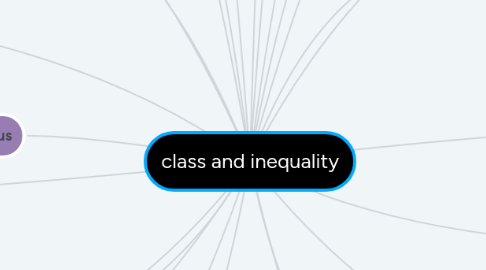class and inequality
by stela Hernandez

1. Class
1.1. A system of power based on wealth, income, and status that creates an unequal distribution of a society resources
2. economic capital
2.1. income: what people earn from work plus dividends/interest from investments, along with rents and royalties
2.2. income patterns reveal how power is distributed
2.3. wealth: the total value of what someone owns, minus any debt
3. social capital
3.1. social network that helps you advance your social status access to resources
4. proletariat
4.1. Marxist term for the class of laborers who own only their labor
4.2. the working class
5. social reproduction vs class moblitity
5.1. social and class relations of prestige or lack of prestige are passed from one generation to the next
5.2. rather than providing opportunities for social class mobility, the educational system helped reproduce the social relations that already exist by passing class position from generation to generation
6. habitus
6.1. dispositions taught and learned through family, education, and the media
6.2. Enculturation
6.3. * life decisions are made on the basis of the families habits
6.4. college education or career
7. Egalitarian society
7.1. a group based on the sharing of resources to ensure success with a relative absence of hierarchy and violence
7.2. *hunter/gatherer societies- their society relied on cooperation and the sharing of food and child-rearing, not hierarchy, violence, and aggression
8. means of production
8.1. factories, machines, raw materials, tool, land, and financial capital needed to make things
9. caste system
9.1. class structure determined by birth
10. Max Weber
10.1. prestige reputation, influenced nd deference bestowed on certain people because of their membership in certain groups
10.2. life chances: as individuals opportunities to improve quality of life and achieve goals
10.3. life chances are determined by financial resources and social resources ( education, health care, food, clothing, shelter)
10.4. class position- relative wealth, power, and prestige- determines access to resources
11. meritocracy
11.1. meritocracy education: students are deemed successful on the basis of their individual talent and motivation
11.2. provides all students with equal opportunities
11.3. social mobility is dependent on ones meritocracy
12. ideology
12.1. a system of ideas ( a mental map of reality) that injustices the status quo: inequality
13. life chances
13.1. as individuals opportunities to improve quality of life and achieve goals
13.2. *life chances are determined by financial resources and social resources
13.3. education
13.4. health care
13.5. food
13.6. clothing
13.7. shelter
14. Inequality
14.1. unequal access to wealth, power, resources , privileges, and status
15. cultural capital
15.1. knowledge, habit, and tastes learned form family that individuals can use to gain access to social resources
15.2. ex: family wealth creates cultural capital for children (they can travel abroad, learn much more than an average person)
16. wealth vs income
16.1. wealth is what you already have/own and income is what people earn from working
17. bourgeoisie
17.1. marxist term for the capitalist class that owns the means of production like: factories , machines, tools, raw materials, land, and financial capital needed to make things
18. social mobility
18.1. movement of ones class position, upward or downward, in stratified societies
19. ranked society
19.1. a group which wealth is not arranged but prestige and status are * positions of high prestige such a a chief are largely hereditary
20. intersectionality
20.1. analytic framework for assessing how factors such as race, gender, and class interact to shape individuals life chances and societal patterns of stratification
21. class stratification
21.1. unequal distribution of power and access to a groups resources, opportunities, rights and privileges based on class
22. Karl Marx
22.1. *capitalist system
22.2. workers sell labor to capitalists in exchange for money
22.3. Bourgeoisie
22.4. proletariat
23. pierre Bourdieu
23.1. * social mobility: the movement of ones class position
23.2. *social reproduction
23.3. habitus
23.4. cultural capital
24. myth of classes society
24.1. *upward social mobility for those who are hardworking and talented, including the potential to rise from rags to riches in a single generation
24.2. * the main determinate of class position and social mobility s NOT one worth ethic but rather structural barriers( no matter how hard you work you have to have connections
25. culture of poverty
25.1. * urban poverty: result in welfare dependency, of lack of motivation, and poor work ethic


